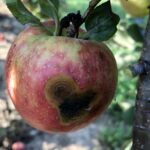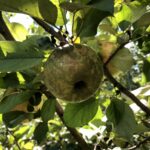For those of you still fortunately enough to have apples, disease management continues to a greater degree than those of us without a crop. Around now (the beginning of cover sprays), the most serious apple pathogens are generally less active, terminal buds have set, leaves have hardened off (and are now less susceptible) and weather is usually getting hotter and drier. Unfortunately, this year has been a bit screwy, with warm-ups, cool downs and frosts, and few trees have set terminal buds. The continued fungicide applications are necessary to protect against the continuing pathogen pressure.
If you are still within the 77-day pre-harvest interval, get that last application of mancozeb on while you still can. It is one of, if not the best protectant against the summer rots, along with controlling scab. When you can no longer use mancozeb, switching over to ziram (with a 14 d PHI) or captan (see label as PHI varies) as a tank-mix or rotation partner is necessary to protect fruit during these frequent and heavy summer rains for the remainder of the season.
The judicious addition of Pristine, Merivon, Luna Sensation, Flint, or Sovran provide excellent control of summer diseases. These are all good to excellent on the summer rots and sooty blotch/flyspeck. In hot, wet years, bitter rot is an especially bad problem on HoneyCrisp, Gala, Empire, and Golden Delicious. Think of what your crop could look like in August, when it is too late to do anything and protect fruit now! Let me remind you (Fig. 1)! Remember, all of these have strobilurins (FRAC code 11) so your decision to use these fungicides during the summer should be balanced against the need for control of early season diseases, the potential for damage by the summer rots, and the limited number of applications recommended on the label.
Strobilurins aren’t your only options, though. Omega provides summer rot disease control (in the fair to very good category), and is a completely different mode of action (FRAC 29). It also, weirdly enough, controls two-spotted spider mite, red mite and apple rust mite. It has a 28-d PHI. Newer options, Aprovia, Fontelis, and Miravis (all FRAC 7) are good to excellent against scab and bitter rot, along with some early season diseases like powdery mildew. Aprovia has a 30-d PHI, Fontelis has a 28-day PHI and Miravis has a 30-d PHI. All are FRAC 7, meaning they are succinate dehydrogenase inhibitor. As Merivon, Pristine and Luna Sensation all have FRAC 7 fungicides, be careful with your rotations!
Lastly, the sooty blotch/flyspeck fungal complex begins the infection process around third cover when rainfall is frequent (and when forest trees are nearby), but they are generally not observed as a problem until later in the season. The incubation period for the sooty blotch/flyspeck pathogens is about 30 days. Keep in mind that captan and ziram provide effective protection for 10 to 14 days at the most (and a bit longer for Topsin M). Topsin-M is effective for most species of sooty blotch/flyspeck, but much less effective on the summer rots. Aprovia, and Miravis are labeled for sooty blotch/fly speck, as is the newer FRAC 3 fungicides, Cevya (12 h, 0 d PHI), which is an excellent choice if you are also trying to control powdery mildew or even apple scab, if weather ends up cooler.
Again, early prevention is better than later regret, but fungicides are only part of the equation. Making sure trees are well pruned, and that the canopy is open to increase airflow and allow pesticide applications to reach the entire tree is essential to controlling these diseases. Another essential piece of management is sanitation: Removing mummies and windfalls reduces over-summering and overwintering inoculum, minimizing the risk of spread. All of these suggestions are easily made, but very difficult to implement.
- Figure 1. Bitter rot. Note the mummy I hold personally responsible for this.
- Figure 2. Flyspeck and sooty blotch.

